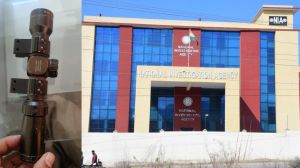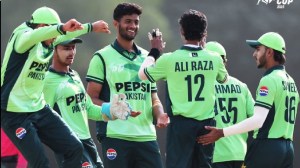Casteism runs deep in our society, with its signs and reflections visible almost everywhere. Among these is the urge for men to assert their descent from fathers with “proper” identities and “strong” bloodlines — a feature attributed exclusively to savarnas. Films have long capitalised on this, using dialogues like “nalla thanthakku piranna (born to a good father)” and “otta thanthakku piranna (born to only one father)” to suggest that lineage defines status and that the respect one is afforded is closely tied to it. These expressions are not only misogynistic but also casteist, with the implications also being that those from lowered castes have only ancestors but no ‘proper’ lineages. In 2007, cinematographer Amal Neerad broke this mould with his directorial debut, Big B, introducing four men who, while not biologically related, are raised as brothers by a single mother and continue to share that bond even as adults. And now that his latest directorial venture Bougainvillea, starring Jyothirmayi, Kunchacko Boban and Fahadh Faasil, is running successfully in theatres, it seems to be a good time to revisit Big B, an unofficial remake of director John Singleton’s Four Brothers (2005), and analyse how it marked a turning point in Malayalam cinema’s trajectory.

Must Read | Lucky Baskhar movie review: A terrific Dulquer Salmaan powers this brilliant Venky Atluri film
Big B also marked a major shift in Malayalam cinema by exploring a terrain less commonly depicted in movies: the port city of Kochi. The Amal Neerad directorial, along with Anwar Rasheed’s Mohanlal-starrer Chotta Mumbai — both released in April 2007 — shed light on Kochi, a home to people from varied cultures and even different countries. For the industry, which until then had primarily revolved around rural settings and often overlooked the importance of the places the stories are set in, Big B served as a wake-up call, showcasing how location is a crucial part of any story as its social, economic, geographic and political elements profoundly influence the lives of its people, making the setting inseparable from the narrative.
Long before it became fashionable for Indian ‘fanboy directors’ to honour their favourite superstars by crafting films headlined by them, Amal Neerad demonstrated the power of this approach as well. But it wasn’t in Big B that he showed it for the first time. His debut movie as an independent cinematographer, Ranjith’s Black (2004), featuring Mammootty himself, playing the now-iconic role of Karikkamuri Shanmughan, a local gangster in Kochi, showed glimpses of this. While Ranjith gave the megastar a striking, never-seen-before makeover and explored a new side of the city, it was Amal’s cinematography that elevated Black, capturing Mammootty’s commanding presence and finesse as Shanmughan. In many ways, Black served as a learning ground for Amal, allowing him to understand Malayalam mainstream cinema from the inside and learn its ethos, limitations and the unique phenomenon that’s Mammootty — insights that would later prove invaluable for him. Amal’s familiarity with the city, honed during his time as a student at the legendary Maharaja’s College in Ernakulam, also likely shaped his cinematic perspective rooted in the city, all of which converged in his groundbreaking debut, Big B.
Watch Amal Neerad and Mammootty’s Big B here:
Amal Neerad’s directorial debut was unlike anything Malayalam cinema had seen, breaking new ground in narrative, filmmaking, character portrayal, performances, aesthetics and more. While masala entertainers often present heroes following massive hype by other characters, none have achieved the same impact as Big B. The investigation into Mary’s murder is entrusted to ACP Balaji (played by Pasupathy) and as her body is taken to the cemetery, CI George (Vijayaraghavan) narrates her life story to him in a nutshell. The pity in George’s face as he talks about her other sons suddenly disappears when he mentions Bilal’s name. “What’s he like?” Balaji enquires, to which George replies, “If you ask me like that, he’s trouble for us.” This precise and powerful buildup not only reflects Bilal’s character but also the way he communicates and behaves.
However, unlike the usual hype that heroes receive, Bilal, upon introduction, is welcomed by dialogues describing how good a person he is, suggesting that though he is infamous in the neighbourhood but is not exactly like that. “No one knows where Bilal came from. One day, he was just in Kochi,” “Mary teacher loved Bilal the most” and “Bilal might be arrogant and impulsive, but he has a good heart,” we hear people saying. Meanwhile, George presents a contrasting, biased image of him to Balaji, claiming that Bilal is merely a criminal. While Mammootty’s first shot is a fitting tribute to his status as a megastar, showcasing his shoe-clad feet splashing water as he exits his car, the first shot of his face pays a tribute to the legendary actor in him, focusing on his sharp eyes filled with subtle, yet sharp emotions. With a handkerchief covering his head, following Muslim funeral customs, Bilal enters the scene, accompanied by Gopi Sundar’s evocative background score. As he approaches the procession with his mother’s body, the adhan (azaan) resonates in the background and the moment immediately hits the hearts of viewers.
Story continues below this ad
Don’t Miss | Amaran movie review: Sai Pallavi, Sivakarthikeyan stand tall in this tale of timeless love
Unlike the colourful, exuberant heroes who come with a sidekick, a side chick and a girlfriend, Bilal is more like a lone wolf but pledged to ensure his family’s safety. That could also be why, when his reputation as a criminal led Mary to banish him from their home, he stayed away, believing his absence would spare her sadness. While thespians often prefer roles with emotional highs and lows to showcase expressive acting, Bilal’s character is mostly stoic, reflecting his solitary and guarded nature. The rare moments when we see even a flicker of emotion cross his face are when he hears about his late mother and when his brother Bijo is killed. “Watching Big B, I realised that each character has their own unique way of crying. ‘Does Bilal cry?’ was never something I thought about while watching, let alone how he would cry. But when Bijo is murdered, Bilal kneels beside him. While Murugan wails, Bilal expresses his grief by hitting him hard on the back (as if to console him). His face remains unmoved; only his hand moves. That’s when it struck me — each character has their own way of crying,” Fahadh Faasil said once during a chat with Cue Studio, underscoring how tough a role Bilal is and the impact Mammootty’s performance has had on his successors.
The megastar’s masterful portrayal of Bilal’s understated nature is a key reason for the film’s impact. At the same time, Big B’s focus on four men, each from troubled backgrounds and facing societal labels as “potential criminals,” added to its unique appeal. While Bilal makes a living as a henchman, Eddy, who once led a life of crimes, has redeemed himself and now runs a hotel, Murugan works as a stunt director in films and Bijo is a student, all trying to rebuild their lives from the ground up, just as Mary hoped each of her adopted children would, the purpose for which she devoted her life.
 The Mammootty-starrer Big B marked cinematographer Amal Neerad’s debut as a filmmaker. (Image: IMDb)
The Mammootty-starrer Big B marked cinematographer Amal Neerad’s debut as a filmmaker. (Image: IMDb)
Despite slow-motion shots often being viewed as overly artificial — and mostly for the right reasons — Amal Neerad glamorised this technique in Big B and has continued to do so with finesse, thanks in part to his masterful use of background score that complements the pacing of these shots. His expertise in cinematography, and therefore the technical side of filmmaking, including editing, has been key in helping him craft visual spectacles, with Big B marking the advent of this signature style. Amal’s handling of on-screen violence is also noteworthy. Although he introduced the Malayalam industry to the aestheticisation of violence, he’s careful not to present these scenes as entirely realistic. Instead, he crafts action sequences that are distinctly cinematic and dramatic, embracing a certain artificiality that he then stylises, making them visually compelling yet intentionally non-influential.
Story continues below this ad
In Big B, Bilal doesn’t dominate all the fight scenes, thus sidelining others. Instead, he only steps in when his brothers require his support and even then, makes just one or two measured moves with high impact, in line with his role as a henchman. “Neeyokke ara touserum ittondu Ajanthayil Aadipaapam kandondu nadakkana teimil nammalu ee scene vittatha. Nintekke ikkanodokke chodichal ariyam (I left this scene (of crimes) while you were still roaming around in kiddie trousers, watching Aadipaapam at the Ajantha theatre. You can ask your older brothers if you want to know more about me),” he says, holding his pistol close to a man’s groin while standing in the centre of a residential colony depicted as a haven for criminals and drug addicts, with residents watching on. Not only does this dialogue highlight his firm control over the city and his lack of fear, but also makes it clear that he is someone to be feared.
Thus, Amal Neerad redefined the idea of a movie hero with Big B, making its sequel Bilal — first announced in 2017 — one of the most anticipated Malayalam films to date. Although seven years have passed since the title reveal and production has yet to begin, a recent update from Mammootty’s son Dulquer Salmaan, during the promotions of his latest film Lucky Bhaskar, confirmed that the project is still alive. “Only Bilal knows when he’ll return. But one thing is certain: when he does, it will be monumental,” he remarked, keeping the excitement around the film alive.




 The Mammootty-starrer Big B marked cinematographer Amal Neerad’s debut as a filmmaker. (Image: IMDb)
The Mammootty-starrer Big B marked cinematographer Amal Neerad’s debut as a filmmaker. (Image: IMDb)































